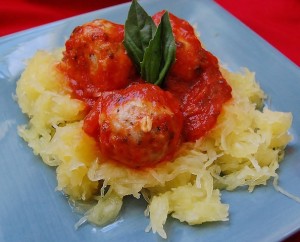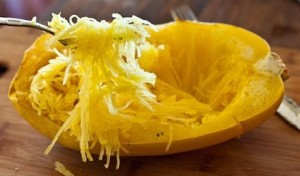 These meatballs are a heart healthy alternative that pair well with a fun pasta substitute that will leave you just as satisfied as the real deal, but for far greater health benefits and a fraction of the calories.
These meatballs are a heart healthy alternative that pair well with a fun pasta substitute that will leave you just as satisfied as the real deal, but for far greater health benefits and a fraction of the calories.
Turkey Meatballs (yields 16 meatballs)
Ingredients
- 1.25 lb package 99% lean ground turkey
- ½ c. old fashioned oats
- ¼ c. ground flaxseed
- 1 egg white
- 1 ½ tsp dried oregano
- 1 tsp dried basil
- 1 tsp garlic powder
Directions
- In a mixing bowl, combine all ingredients. (Feel free to mix with either a fork or your clean, washed hands!) Make sure all ingredients are evenly incorporated.
- Divide the meat mixture up and, with the palms of your hands, roll the meatballs into 16 evenly-sized balls. Place them into a square baking dish that has been lightly sprayed with a nonstick spray.
- Oven Method: Bake for 25 minutes at 350 degrees, or until internal temperature of each meatball is 165 degrees. (You can either bake the meatballs alone to add to sauce later, or you can bake them in the sauce which will thicken up a lot.)
- Crock Pot Method: Place uncooked meatballs in a crock pot with a jar of tomato sauce. Cook on low for 6-8 hours.
Spaghetti Squash vs. Pasta
 If you’ve never heard about spaghetti squash, it’s an oblong yellow squash that when cooked, has a flesh that can be forked apart to look like strands of bright yellow spaghetti. Not only does it taste delicious (especially if you’re a fan of al dente pasta!), but it has a much more waist-friendly nutritional profile compared to regular spaghetti pasta. Take a look!
If you’ve never heard about spaghetti squash, it’s an oblong yellow squash that when cooked, has a flesh that can be forked apart to look like strands of bright yellow spaghetti. Not only does it taste delicious (especially if you’re a fan of al dente pasta!), but it has a much more waist-friendly nutritional profile compared to regular spaghetti pasta. Take a look!
|
|
Spaghetti Squash (1 cup) |
Pasta Spaghetti (1 cup) |
| Calories |
42 |
221 |
| Fat (g) |
0 |
1 |
| Saturated Fat (g) |
0 |
0 |
| Cholesterol (mg) |
0 |
0 |
| Sodium (mg) |
28 |
1 |
| Total Carbohydrate (g) |
10 |
43 |
| Dietary Fiber (g) |
2 |
3 |
| Sugars (g) |
4 |
1 |
| Protein (g) |
1 |
8 |
While you may look at the normal pasta and think you’re better for the greater protein content, when you’re adding something like these tasty turkey meatballs, you really don’t have to worry about that. Plus, you could even have double the amount of spaghetti squash for a little over a third of the calories of one cup of pasta!
Combine spaghetti squash with a couple of the heart healthy turkey meatballs here, and you’ll have a comforting meal with all the nutritional benefits traditional spaghetti and meatballs lack.
Note: Feel free to make your own tomato sauce by cooking and blending tomatoes, spices, and a little onion. If you’re using a jarred sauce, make sure you find one with no added sugar and no added salt.
Meatball Nutrition
For one meatball: 59 calories, 1.3 g fat, 0.1 g saturated fat, 21.8 mg cholesterol, 21.5 mg sodium, 2.5 g carbohydrates, 0.8 g fiber, 0.1 g sugar, 9.7 g protein.
Turkey: Turkey contains tryptophan, protein, selenium, vitamin B3, vitamin B6, phosphorus, choline, and zinc. As a white meat, increasing your intake of turkey and other poultry products (while decreasing red meat consumption) will lessen the risk of heart disease, type 2 diabetes, and colon cancer.
Oats: Oats are a great source of manganese, selenium, phosphorus, fiber, magnesium, and zinc. Due to the fiber content, oats are very helpful with lowering cholesterol levels. There is also a plethora of antioxidants, which also help reduce the risk of cardiovascular disease. They nutrients in oats also help stabilize blood sugar, enhance immune response, lower type 2 diabetes risk, protecting against breast cancer, and may protect against childhood asthma.
Flax: Flaxseeds contain omega-3 fatty acids, manganese, vitamin B1, fiber, magnesium, tryptophan, phosphorus, and copper. While the heart healthy omega-3 fatty acids are heat sensitive, and thus you lose some of those benefits when you bake these meatballs, the added fiber and the associated gastrointestinal and blood sugar regulating benefits are still enough to add this little seed. Always be sure to grind your flaxseeds, though, as whole flaxseeds aren’t digested very well!
Egg Whites: While the yolk of the egg has many vitamins, minerals, and some protein, when you use just the white you remove all the cholesterol, making this a more heart healthy option. Additionally, the egg white is lower in calories. A full egg has 71 calories, but if you remove the yolk, you have only 16 calories, all from its four grams of protein.
Oregano: Oregano is an herb of the mint family that offers antibacterial, antifungal, and antioxidant health benefits.
Basil: Basil contains vitamin K, iron, calcium, vitamin A, fiber, manganese, tryptophan, vitamin B6, magnesium, vitamin C, and potassium. The health-promoting benefits are due to basil’s flavonoids and volatile oils. Various health benefits include DNA protection, anti-bacterial properties, anti-inflammatory effects, and providing nutrients essential for cardiovascular health.
Garlic: Garlic is a good source of manganese, vitamin B6, vitamin C, selenium, calcium, tryptophan, phosphorus, vitamin B12, and copper. It offers cardiovascular benefits, anti-inflammatory benefits, antibacterial and antiviral benefits, and cancer prevention. Also, recent studies are suggesting garlic may even improve the absorption of iron.

Spaghetti!! Meatballs!! Yummy, sounds delicious
It has really been a big hit! Enjoy 🙂